By Jason Crawford Samios-Uy

Running Time: 2 hours and 10 minutes with one 15-minute intermission
Religion is always a tricky and sometimes touchy subject in the arts, but that’s only when its taken too seriously. The latest offering from Fells Point Corner Theatre, the Baltimore Premiere of The Divine Sister, by Charles Busch finds a delightful balance. Directed by Steve Goldklang, with Set Design by Roy Steinman, Lighting Design by Charles Danforth III, Sound Design by Andrew Porter, and Costume Design by Anthony Lane Hinkle and Mary Bova (of A.T. Jones) this piece tickles the proverbial funny bone without offending and the story actually isn’t heavy on religion but sending a message of love, faith, and hope.
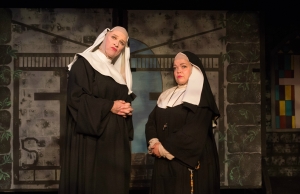
Steven Shriner and Holly Gibbs. Credit: Tessa Sollway
Set Design by Roy Steinman is simple, yet detailed. Two moveable walls on wheels cleverly allow for various locations including an underground passageway, a courtyard garden, and a sitting room of an elegant mansion. Steinman’s design is traditional in the way that the scenes are definitely painted and not necessarily realistic, such as stained glass windows and a fireplace and mantel, but absolutely fitting for this production. Being a fan of traditional theatre and suspension of disbelief, I rather enjoyed the simplicity of the set. The entire set is designed to display stone work, as you would see in old churches and buildings and the stone painting is on point. Steinman uses his space very wisely, using the surprisingly large stage and breaking it up into sections with the moveable walls. The set pieces chosen are fitting and really separate the scenes and locations. Overall, the Steinman’s Set Design is appropriate and smart adding charm to the entire production.
The scene changes are precise and careful, but often go on a few seconds too long. There are quite a few set pieces that have to make their way on and off stage between scenes and I’m sure the scene changes will cut their time as the production runs.
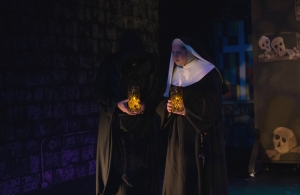
Tom Lodge and Kathryne Daniels. Credit: Tessa Sollway
Lighting Design by Charles Danforth III does more than light the actors on stage but sets the mood completely for each scene. Whether outside in a courtyard or in an underground tunnel, the lighting scheme matches the action and setting. Danforth’s design blends in with the action and is absolutely appropriate for the piece.
To go along with Lighting Design, Andrew Porter’s Sound Design is on point for this production. Though there are not a lot of sound effects in this production, what is utilized is definitely befitting. Namely, the realistic “dripping water” sound effect used in the underground tunnel setting adds value to the scene and the production.

Steven Shriner and Anne Shoemaker. Credit: Tessa Sollway
The use of recordings is wise and is hilarious as the actors blatantly lip-sync through an entire number, skipping and dancing as they do. It’s worthe mentioning the song in the the courtyard between Mother Superior and Agnes is not only hilarious with the afore mentioned lip-syncing and skipping, but has beautiful vocals by actresses Holly Gibbs and Anne Shoemaker, with guitar by David Shoemaker.
Costume Design by Anthony Lane Hinkle and Mary Bova (of A.T. Jones) is authentic and fun for this piece. Set in the mid 1960s, styles and fashion were flashy and all over the place, but Hinkle and Bova manage to capture the essence of the 60s with their Costume Design. The nuns, of course, are your traditionally dressed 1960s nuns with the full habit and rosarary and the actors seemed very comfortable in these genuine-looking habits, moving freely about the stage. Outside of the nun costumes, the “civilian” character costumes were equally as impressive. The many costumes of the character named Mrs. Levinson, were all on point and fitting of the character and time, with polyester looking material and vibrant colors of a wealthy middle-aged woman with a penchant and propensity for current fashion and haute couture. Kudos to Hinkle and Bova for their impeccable design.
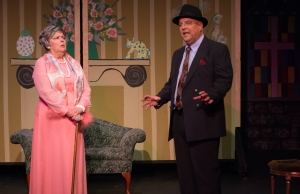
Lynda McClary and Tom Lodge. Credit: Tessa Sollway
Steve Goldklang’s Direction of this piece is impressive and concise as his vision for this very funny and upbeat piece is clear making for a very well put-together production. Goldklang seems to understand this story is not merely making fun of any particular religion but using humor to tell a story and send an important message of trust and belief.
Though I don’t consider The Divine Sister a traditional farce, it does have farcical aspects and quick entrances and exits, but, overall is just a very witty comedy that Goldklang understands and keeps that delicate balance of mocking and poking fun. He keeps the action moving and, aside from the lengthy scene changes, manages to use the immense talents of his cast to keep the stor
y moving forward. Overall, Steven Goldklang does an outstanding job at the helm of this production.

Kathryne Daniels as Sister Walburga. Credit: Tessa Sollway
Moving on to the performance aspect of this piece, Kathryne Daniels as Sister Walburga/Mrs. Macduffie has a great look and command of the stage making both her characters interesting and entertaining. Her characters are completely different and Sister Walburga as the stern Sister from Berlin may not be all she seems while Mrs. Macduffie, the cleaning lady, seems to know everything that’s going on in their little circle and is happy to share her information. It seems Daniels is the only actor required to use accents for her characters (German for Sister Walburga and Scottish for Mrs. Macduffie) but she may have benefited by working with a dialect coach as her accents for both characters were a dicey, at best. Regardless, her performance was impressive and she seems to understand her characters and plays them beautifully.
Tom Lodge as Brother Venerius/Jeremy is likable and carries the weight of being the only male character in the entire piece. He is comfortable and confident onstage and his portrayal of Jeremy is believable and moves the story along through his dialogue, making him an involved character. However, for as good as he portrays Jeremy, his portrayal of Brother Venerius, whose face we never see, falls a little flat. Brother Venerius is a mysterious character lurking in the underbelly of the convent but I couldn’t pinpoint where is character is supposed to be from as the accent he chooses to use is all over the place and a little strange. Overall, Lodge gives a very strong performance and carries his characters quite well.
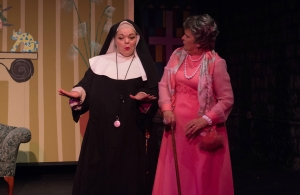
Holly Gibbs as Sister Acacius and Lynda McClary as Mrs. Levinson. Credit: Tessa Sollway
Holly Gibbs is brilliant as Sister Acacius a.k.a. Lily in this production of The Divine Sister. She has great comedic timing and her understanding of the character is apparent as she pulls off the New York accent and mannerisms impeccably. As a nun who’s going through some things, including not necessarily wanting to be a nun anymore, and has an interesting past along with Mother Superior, Gibbs plays the role with the right amount of humor and is absolutely believable as Sister Acacius, the right hand man to Mother Superior. Gibbs never disappoints and her work in this production is no different.

Kathryne Daniels, Anne Shoemaker, and Holly Gibbs. Credit: Tessa Sollway
Anne Shoemaker as Agnes, the postulate who is having visions and healing the sick, is a standout in this production. Her comedic timing is on point and her character choices are impeccable. She plays this role with the perfect amount of “crazy” that is required for this character. A cross between Maria Von Trappe and Annie Wilkes (from Stephen King’s novel Misery), Shoemaker finds a perfect balance of innocence and insanity for this character and her depiction of the transition her character goes through is also admirable, In general, Shoemaker is confident and commanding and gives a strong and impressive performance.
Lynda McClary as Mrs. Levinson/Timothy is hands down one of the highlights of this production. With that being said, in the role of Timothy, the young man who is bullied and not the best athlete, along with other adolescent issues, McClary is a bit much. An adult actor playing a child is always tricky and, for this production, McClary takes it to the extreme to being almost annoying, rather than funny, but, if anything, she is absolutely dedicated to the role, giving 100%. Her portrayal of Mrs. Levinson, however, is a completely different story. Mrs. Levinson is the wealthy, fashionable, and philanthropic widow who has secrets of her own and McClary pulls this role off flawlessly. With just the right balance of snootiness and humility, she is a riot with immaculate comedic timing and is an actress who isn’t afraid to make a fool of herself for the good of the production. She’s a seasoned actor and her confidence and command of the stage makes for a funny and outstanding performance.
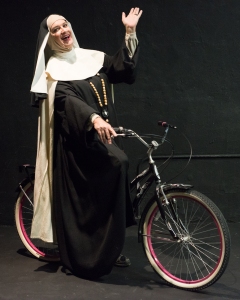
Steven Shriner as Mother Superior. Credit: Tessa Sollway
Last but certainly not least is Steven Shriner as Mother Superios a.k.a. Susan who is another absolute highlight of this production. For some reason, a man in drag is still funny after all the years of it being a bit in show business and this production is no different. Shriner is superb as Mother Superior and his delivery of the clever lines and his timing is just about perfect. The success of his performance is the character of Mother Superior seriously, not as a mockery, and it makes for a very strong, funny, natural performance. His soothing voice and mannerisms make for an authentic portrayal and a very likable character. As both Mother Superior and Susan, the young and sweet, but cut-throat New York reporter, Shriner gives a confident and commanding performance and I’m looking forward to seeing more from him.
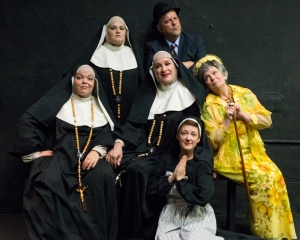
The Cast of The Divine Sister. Credit: Tessa Sollway
Final thought… The Divine Sister at Fells Point Corner Theatre is witty, hilarious show with a clever script and excellent performances from the ensemble. The piece pokes fun at religion but certainly does not mock it and, in the end, sends a good message of faith and hope through crafty humor that will have your sides splitting. Get your tickets now! You don’t want to miss this one!
This is what I thought of Fells Point Corner Theatre’s production of The Divine Sister. What did you think? Please feel free to leave a comment!
The Divine Sister will play through December 18 at Fells Point Corner Theatre, 251 S Ann Street, Baltimore, MD. For Tickets, go to fpct.org for information or purchase them online.


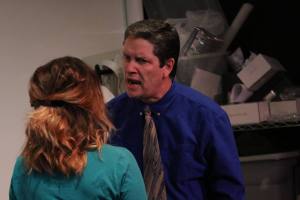
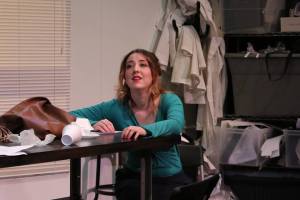












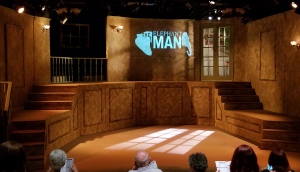 To begin, walking into the main theatre of Fells Point Corner Theatre, my initial excitement came from Kel Millionie’s beautiful set design. The unit set has smart levels that all lead to the center of the stage where most of the action takes place. The main entrance, through glass plated french doors blend nicely into the set design and the lower entrance, a hallway of sorts, is a nice contrast to the elegant french doors. The earthy tones lend well to expressing the Victorian era. Millionie used his space very wisely, cleverly creating storage for set pieces not in use within the set itself. The clean, subtle set was near perfect for this production.
To begin, walking into the main theatre of Fells Point Corner Theatre, my initial excitement came from Kel Millionie’s beautiful set design. The unit set has smart levels that all lead to the center of the stage where most of the action takes place. The main entrance, through glass plated french doors blend nicely into the set design and the lower entrance, a hallway of sorts, is a nice contrast to the elegant french doors. The earthy tones lend well to expressing the Victorian era. Millionie used his space very wisely, cleverly creating storage for set pieces not in use within the set itself. The clean, subtle set was near perfect for this production.





